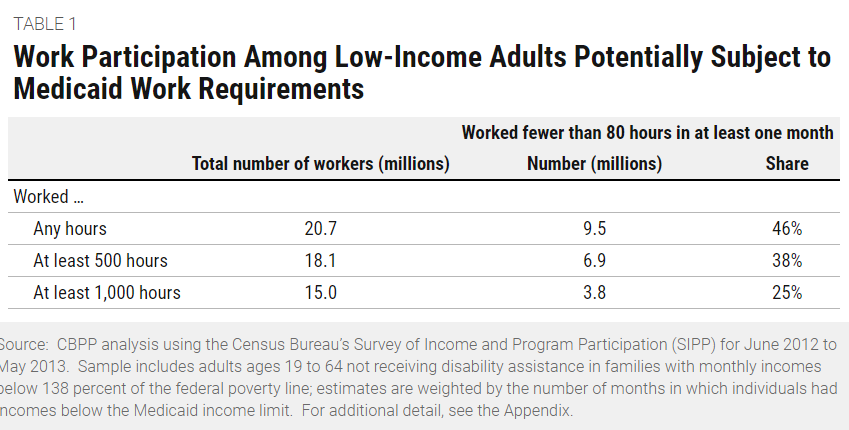A new report from the Center on Budget and Policy Priorities demonstrates the widespread nature of the harm caused by so-called “work requirement” policies to safety-net programs.
Work requirement provisions are usually sold as a means of forcing idle Americans into work, but the CBPP report demonstrates just how many Americans who are already working would be harmed by work requirements to Medicaid. Maine is one of several states that has applied to the federal government for permission to impose a work requirement on low-income adults as a prerequisite for them to access affordable health care.
Researchers at the CBPP analyzed data from two Census Bureau datasets, the Survey on Income and Program Participation (SIPP) and the Current Population Survey (CPS), to evaluate the impact of work requirement provisions on low-income, working Americans. They used the provisions of Kentucky’s work requirement, of 80 hours of work per month for adults aged 19-64 who don’t qualify for Social Security Disability Insurance. Maine’s proposed requirement is very similar – 20 hours of work per week, averaged over the course of a month.
Both the SIPP and CPS are longitudinal datasets, meaning that they track individuals over a set period of time. This allows researchers to analyze the month-to-month experiences of people in the survey. Using this data, the CBPP researchers could determine whether individuals would be able to meet work requirements consistently over the course of a year. Their analysis found that nearly half of low-income working adults who would be subject to work requirements didn’t consistently work enough hours to ensure that they wouldn’t fail the work requirement for at least part of the year. This would cause those working Americans to forego health care coverage for a period during each year. Even among people working 1,000 hours over the course of the year (the equivalent of 80 hours a month), one in four would have failed the work requirement in at least one month.
The CBPP report demonstrates that even hardworking Mainers would be harmed by the kind of work requirement sought by the LePage administration. An additional troubling provision of Maine’s work requirement is that individuals would only be permitted to miss the requirement for three months in any three year period before they are frozen out of Medicaid completely for the remainder of that three year period.
The report’s findings demonstrate just how out-of-touch work requirements are with the reality of 21st century work for low-income Mainers. Low-wage work is concentrated in sectors such as accommodation, food service and retail, where turnover is high and work is often seasonal. Even when Mainers are employed, their hours and schedules are often erratic and uncertain, as businesses increasingly deploy techniques like on-demand scheduling.
These new findings offer more evidence that work requirements do more harm than good and are a failure as a public policy tool.




